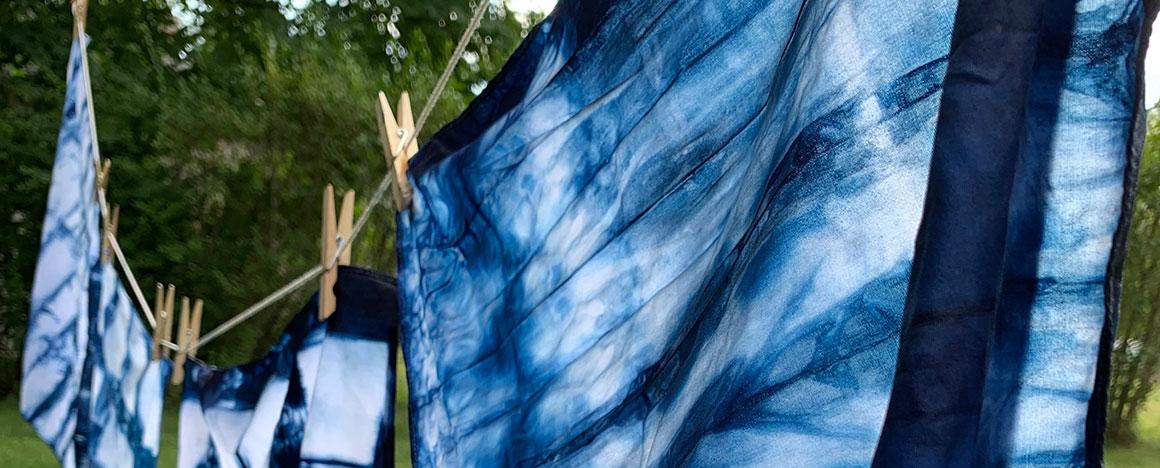Community Outreach

The faculty and students of the Department of Chemistry at Tufts University are committed to supporting programs that engage future scientists early in their development. Many of our outreach programs have been created to provide opportunities to learn about cutting-edge developments in chemistry and foster excitement of chemical sciences.
We invite you to explore specific events and our virtual learning opportunities sponsored by the Department of Chemistry.
Indigo Workshop
The Indigo workshop for high school students introduces the organic chemistry of indigo. Specifically, students synthesize the compound and analyze their products to evaluate their purity in a college lab. Additionally, we provide the opportunity to dye fabric in an indigo vat so to witness the oxidation reaction. Each workshop may be tailored to best meet the needs of the attendees.
Reverse Science Fair Program
Recently featured in the Journal of Chemical Education, the Reverse Science Fair builds relationships between high school students and graduate student researchers by swapping the roles that each play during a traditional science fair. Initially, graduate student researchers are introduced as young scientists as they exhibit and discuss their own research at poster presentations at the high school. Then, the high school students have the opportunity to discuss their own science fair projects at a school-wide fair with the same graduate students who serve as judges at this event.
Computational Chemistry Modules
Computational Chemistry uses computer simulations and modeling to study phenomena that are often difficult to observe in the wet lab. These tools help scientists understand how molecules move, interact, and change over time. We invite high school students and teachers to explore the exciting intersection of Computer Science and Chemistry through these three hands-on modules: molecular docking explores how a molecule can fit into a protein’s binding site; peptide molecular dynamics simulation shows how a peptide folds and how amino acid substitution can change its shape; fortran and molecular dynamics simulation dives deeper into understanding how molecular dynamics simulation works.
Paper-Based Devices
It is possible to create powerful analytical tools that are simple and inexpensive devices made from layers of paper and tape. By using these paper-based devices, middle to high school students can learn about capillary action, microfluidics, analytical chemistry, and even healthcare. Students are given the opportunity to use these devices to study food, water quality, and investigate diseases.
Chemistry Laboratory After School Program
During five or six weekly visits, Tufts graduate students lead fourth and/or fifth graders through hands-on experiments that stress open inquiry. These elementary students are guided as they conduct investigations, such as a homemade lava lamp, color changing chemical reactions, algae string/balls, and cyanotype photography. The specific types of investigations will vary based upon the instructors’ expertise and the students’ interests.
Previously Supported Programs
-
The Sweet Science workshop provides high school students with an opportunity to carry out organic synthesis experiments similar to those used in modern chemical research and drug discovery. Students learn how to successfully plan, setup, analyze, and purify a chemical reaction. Products from these reactions are analyzed using Mass Spectrometry, which provides the students with exposure to this powerful analytical technique.
-
Nanoscience for High Schools
Nanoscience for High Schools introduces high school students to a teaching grade, portable scanning tunneling microscope (STM). STM enables the visualization of geometric and electronic properties of atoms and molecules. Through discussions with current graduate students, interactive student exercises, and STM demonstrations, students are introduced to the scientific process, atomic scale and resolution, laboratory grade equipment, and nanoscale application.
-
This program is available to public and private schools in the area (Somerville, Medford, Malden, Arlington, Cambridge, and Winchester), as well as after school programs and other organized activities. Typically, undergraduate students will visit science classes to present some thrilling chemistry classroom demonstrations. These demonstrations are designed to excite students about science in general and in particular chemistry.
-
The Department of Chemistry faculty, postdoctoral scholars, and graduate students welcome high school visitors to campus. Laboratory tours provide students with opportunities to gain a close-up view of scientific research. These programs are designed to foster excitement about inquiry-based science and allow students to connect what they are learning in the classroom to real world research.